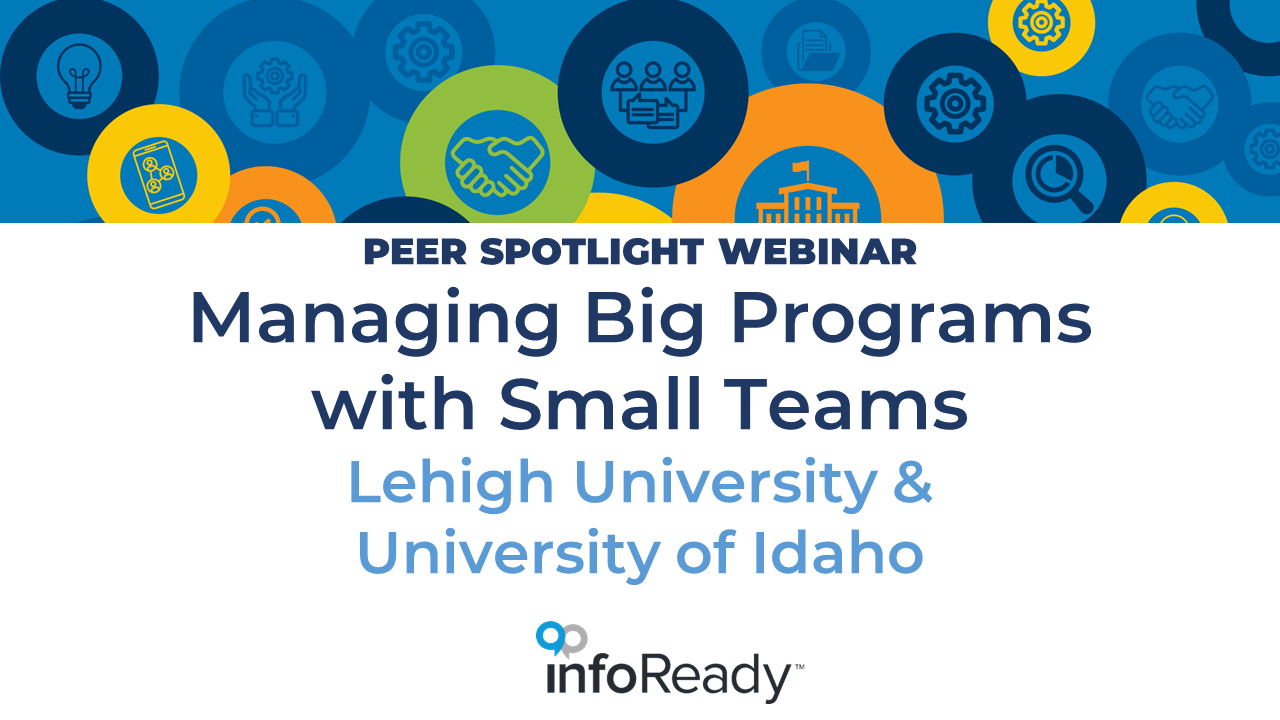One of the most popular ways institutions and organizations make use of the InfoReady platform is by managing internal funding. Gwynne Grasberger and Laura Dean from Drexel University, and Alicia Feltner from Indiana University, shared their top tips for setting up and running these opportunities at their schools. They emphasized the importance of keeping things consistent and transparent when handling different internal funding competitions.
Setting Up Your Timeline
Administrators should ensure applicants and reviewers have ample time to craft thoughtful and thorough responses. For opportunities with an external deadline, like limited submissions, it's best to post the RFP to InfoReady at least 6 months ahead if possible. For strictly internal competitions, such as seed grants or faculty awards, 2-3 months should suffice, depending on how complex the review process is.
Recruiting Reviewers
All agreed the most challenging aspect to facilitating any internal funding opportunity is recruiting reviewers and keeping them engaged. The goal is always to maintain a large pool of reviewers across different disciplines, knowing that a 50% response rate is common. Drexel sends out a personalized email from their Provost asking faculty to volunteer as reviewers, where they note the applicability of the internal peer review process to having the same role for external agencies or publications. Serving on an internal review committee is often a gateway to being a reviewer for peer-reviewed journals. It is also an opt-in process, which ultimately leads to a higher response rate on review submissions.
Creating and Advertising the Opportunity
It only takes about 10-15 minutes to create a brand new competition in InfoReady. However, using templates can reduce this time to about a minute! Indiana University uses a combination of standard, site-wide templates and opportunity-specific templates for recurring competitions to quickly post to their site.
Once the opportunities are up, Alicia suggests teaming up with your communications team to send out friendly, targeted emails to faculty listservs at different times, depending on the internal submission deadline. She also likes to send personal notes to finance offices that collaborate with specific centers or institutes that might be interested. Each message includes handy direct links to the details and application form on their InfoReady site.
Managing the Review Process
As applications start coming in, administrators work with their pool of reviewers to match the best ones with each application. Indiana typically gives about a week after the application deadline for any letters of support to arrive, if needed. Depending on the opportunity, they might invite past winners to be reviewers since they bring a special perspective, especially for limited submissions.
At Drexel, they make sure the review process stays consistent, no matter how many applications come in. They aim for three reviews per submission, and usually start with five or six reviewers. They have two weeks to complete their reviews, which gives them plenty of time to provide thoughtful feedback while keeping the task top of mind. To keep things fair, they guide our reviewers through a training module during onboarding and make sure not to assign reviewers from the same department, school, or college as the applicant.
Awarding (and Rejecting)
At both institutions, senior leadership plays a key role in making the final award decisions. Drexel keeps applicants in the loop by sharing reviewers' anonymous comments and scores through InfoReady, and they even post the entire award decision process on their website for everyone to see. Over at Indiana, they send out formal award decision notices to applicants outside the system, while also making sure to log these decisions in InfoReady for easy reporting. Indiana shares review feedback with applicants on a need-to-know basis, which helps keep things running smoothly.
Post-Award and Data Management
Once the award decisions are made and applicants are informed, most of the work for the internal funding opportunity wraps up. Alicia suggests giving the competition template a quick update while the details are still fresh in your mind. After that, administrators can archive the competition to tidy up their active list. Drexel prefers to wait at least six months after the internal deadline before archiving, just in case any tweaks to applications or reviews are needed.
InfoReady allows administrators to create and send post-award reports (called progress reports) to measure ROI for the project. Indiana also uses the system to seamlessly channel data into their custom-built repository for historical records, ensuring everything lines up with pre-InfoReady opportunities. Administrators can easily mix and match competition-specific and sitewide reports to download and play around with the data in all sorts of ways.
Conclusion
A big thank you to Alicia, Gwynne, and Laura for sharing their fantastic insights on managing internal funding opportunities with InfoReady. Their dedication to keeping things consistent and transparent really shows their commitment to running smooth and efficient processes.
To learn how InfoReady can help your internal funding programs run efficiently, request a demo or email us at info@inforeadycorp.com.




